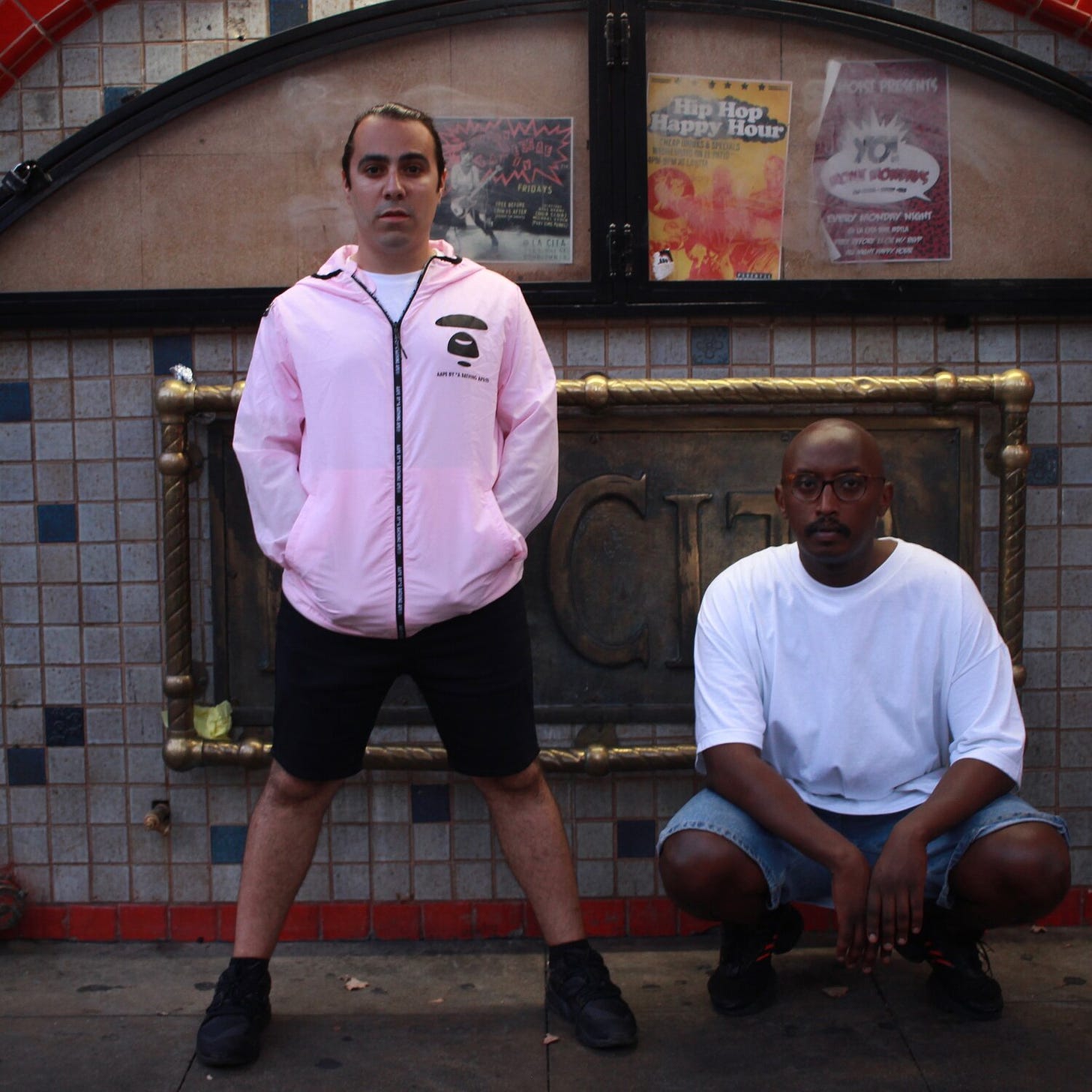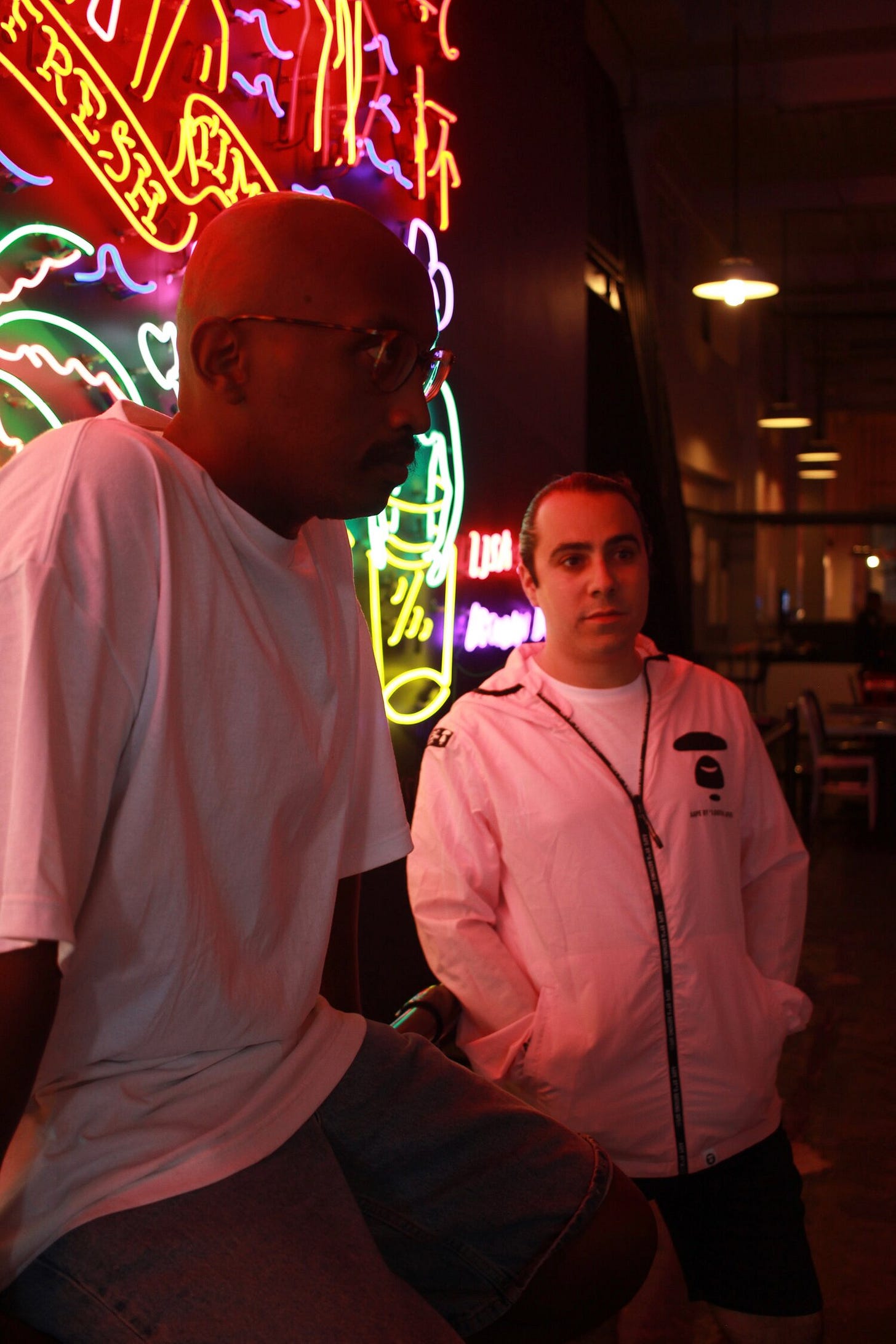Neza Alexander: the Chain Letter Interview
NEZA ALEXANDER: THE CHAIN LETTER INTERVIEW
NEZA ALEXANDER, made up of Neza Rufuku and Alexander Halliday, are an old school kind of rap group. Not in the way they sound — their debut album “Chrysanthemum” continues their hard-hitting style; heavy beats, auto-tuned flow — but in the way they perform. My friend Drew likes to tell me about when he worked at CBGBs in the 80s how punk, hardcore, and rap groups shared stages and bills all the time. NEZA ALEXANDER continues this tradition, often playing shows alongside punk bands like dimber, noise bands like Deyssi, and rock bands like Donator.
I’ve always felt like rap is the punkest of genres. It’s protest music that reterritorializes sound and language. NEZA ALEXANDER’s output mirrors this idea. Their first single from the new album “Poison Berries” was about reclaiming black culture from capital and hierarchy. The song’s proceeds from streaming services and Bandcamp the group is donating to the Black Alliance for Just Immigration (BAJI.org), a cause that is close both to Neza and Alex’s heart, as well as ours here at Chain Letter.
Today, the band is sharing another song ahead of the album’s release tomorrow. “Jade (feat. Pritty)” is the album closer and it’s the first time NEZA ALEXANDER has had a guest on one of their tracks. Here’s what Neza said about the experience: “Jade, came from a different place. We were trying to have some fun with it. Alex’s production on this had bounce that really caught. We delivered a sound like we tapped into our alter egos for this. We’ve never had features, but had to put our brother, Pritty on it. It just felt right and made sense. He’s one of the most versatile artist we know. He’s a St. Louis native who’s released music on Mad Decent and has worked with producers like Dylan Brady, AOBeats & Judge.”
Check out “Jade (feat. Pritty)” below and read our in-depth interview with the band. Chrysanthemum hits streaming services Friday, June 25th.
Chain Letter · Jade (feat. Pritty) by NEZA ALEXANDER
The interview:
CL: The new album “Chrysanthemum” is sonically and lyrically more precise, the beats kick, the words cut, the vibe is intensely acute, and at times almost panic-inducing. It’s as if there’s a desperation to be heard here that I don’t recall hearing before. To what do you attribute this evolution in your songs?
Alex: Our live show is what really evolved our sound I think. We took all the energy we had from our last run of shows before COVID shut us down and put that into these songs, so I think that's where the aggressiveness comes from. We were frustrated after being on a steady roll and ramping up our shows, booking gigs outside of LA, and then having to cancel it all.
Neza: Like Alex said, shows have definitely evolved our sound. I would treat our recorded sound and live shows differently, almost as two different worlds. Our recorded sound is just a different way to experience our story telling, but it shouldn’t limit us to that delivery when we perform. While performing I can fully express my words, by being more free and open, using my body as an instrument to evoke emotion. There were moments during the recording of our new project where I would use the performance elements to enhance the delivery. While recording, it’s sometimes harder to capture those feelings, but I really tried to not be so in my head about it and let go.
CL: At Chain Letter, we take a materialist view of music, and by extension, history. What were the personal events and experiences that inspired you to create this music?
Alex: I know the events in our country have very much inspired these songs, all of the senseless killing of POC by police. But personally we’ve both experienced tragic losses over the last few years, for myself losing my dad was tough.
Neza: Each individual song has it’s own thing and things and things and things. There are so many layers in there. It’s hard to pinpoint one theme that serves as a catalyst for Chrysanthemum. It’s usually things that I have direct connection to. The constant in most of my writings is the need to hear myself say something. Get that something off my chest and put it into the ethos. Sometimes, I can take this me against “them” approach, but “them” can sometimes be an attachment of myself. Don’t get it twisted, “them” in another iteration could also be people that benefit from a system, that’s not made to benefit all. So, there can be many scopes to view from. Layers!
CL: We’re also into process. Break down the process of making “Poison Berries.”
Alex: “Poison Berries” rose out of me switching up my production process and moving over from Logic to making more songs on Ableton, which for me is a simpler process to get an idea out quickly. I focused on creating simpler beats with more room for Neza’s vocals which is something I hadn’t focused on initially. Plus my computer had all new plugins and samples so it was really starting over with new tools. I started with the drums and knew I was looking to make a beat with a rim click.
Neza: Alex played the instrumental, and automatically knew I wanted to lace it up. It’s such a new sound, and I really like when Alex pushes himself to create outside of a norm. I really feed off of that progression. I also like to challenge myself, to write to a whole new vibe, as well. The simplicity of the track but the depth of the chords really had me. It’s easy when you can paint a scene before you even start putting words on to it, and the scene was a revolution. I took a more personal-centered approach at the beginning, then got into the bigger picture. Part of the picture is the flawed music machine that’s not there to empower us, but to extract from us. As BIPOC, establishing our paths and building our own systems to empower the powerless, is the way. These can be big ideas and difficult to scale but it can exist at all levels.
CL: It seems everything is political today, at least that’s the gripe. I’d argue everything in the public sphere is political. Do you agree? And if so, what politik is “Chrysanthemum” espousing? If you don’t think all public sphere activity is political, do you consider NA a political group?
Alex: I think that’s definitely true now in our society where almost all comedy/news revolves around politics or some politicized aspect of our culture. When we began the project I wouldn’t have considered us a political group but Trump taking office and the events following definitely took us more in that direction.
CL: Why make art in a world dominated by commerce?
Neza: Art can serve as a form of disruption in the midst of all the noise.
CL: Does free will exist?
Alex: I think it depends on your definition of free will and also depends on what type of community and society you live in. I think you can allow yourself to believe it exists but it comes down to the choices you make. Sometimes we act on impulse and we make choices against our free will.
Neza: No! At some level we’re still abiding and playing into something outside of ourselves. This can also become so internalized that we unknowingly do it. It’s a big simulation and to break it is difficult because we’ve become so dependent on it, and not by choice. We’re only given so many lanes to take, and even if we create our own lanes it’s still us being reactionary. My answer might change tomorrow, but who knows.
CL: Identity is an integral part of what makes each person an individual, yet so much of our identity is beyond our control. For example, it was just by chance that I was born to Christian hippies in Northern California in 1979, with genetic predispositions to alcoholism and depression, yet all these things define me and my experience. To what extent is identity valuable in informing me who I am?
Neza: My identity and environment I grew up around are a part of me. It’s a part of my code, how I move and speak. There are many beautiful things that I embrace about my identity, but there’s always the other side. I don’t have to accept that it other side of me, but they won’t just go away. This will forever be my constant battle. Just becoming aware of all sides of me is very important to me, and helps with doing the work. I’m still doing the work of even just embracing the beautiful parts of my experience too. I’ve been coming more into myself presently. The music helps me find my voice and my power. It’s already there I just have to keep finding it, and honoring it.
CL: What’s the last thing that inspired you?
Alex: I spent 5 days in Joshua Tree this year for my 30th birthday and managed to stay up all night to catch the beautiful sunrise over the desert. Watching the desert wake up and the gleam on the plant life inspired me and reminded me that life is all around us, thriving and living, existing. It inspired me to keep moving on and to keep working hard at the things that fulfill me like music and working with creators.
Neza: Easy! My niece, Fiona.
CL: Who’s your hero?
Alex: When I was a kid I used to say Travis Barker because his drumming really helped shape my playing and helped me learn how to apply Buddy Rich-style fills to punk rock songs, but now that I've grown up, somewhat, my hero is absolutely my dad. He saw the world for what is was and set out to see it all. He was in Iran during the revolution in 1979, we were in Moscow together during Y2K. He brought our family places I could only dream of going. I'll never forget getting "lost" with him at the Marrakesh Market in Morocco when I was 8 years old. Thankfully my dad spoke several languages and used his French to get us out of there.
Neza: My little brother. The G.O.A.T.!!!
NEZA ALEXANDER “Chrysanthemum” out tomorrow on all streaming platforms. Hopefully there will be shows, soon, too!




